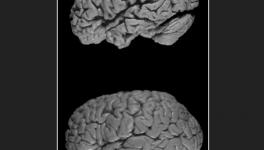New Research in Alzheimer’s Disease Throws Light on Brain Tangles

Image Source: Picpedia.
One of the hallmarks in Alzheimer’s disease is the formation of tangles in neurons. A particular protein known as the ‘tau’ forms tangles, the twisted and distorted aggregation resulting from the accumulation of the protein outside the brain cells. The tau protein plays an important role in healthy neurons where they are an inherent part of the microtubules. The microtubules are engaged in maintaining the shape and structure of healthy cells. The tau proteins are found in abundance in neurons of the central nervous system in comparison to other parts of the body.
In the pathogenic condition of Alzheimer’s disease, this protein goes astray, it disintegrates from the cell and forms an aggregation outside. The tau tangles hampers in the normal functioning of the neurons, especially in role played by the neurons in memory.
A new research offers insights into how the tau proteins escape from the brain cells and form the tangles, which has remained an open question to the Alzheimer’s researchers. The research, conducted by an Alzheimer’s disease research group of Queensland University has been published recently.
The study revealed that neuronal tangles are formed in a cellular process that deviates from the usual functioning and allows the toxic protein tau to leak into healthy brain cells. Prof. Jurgen Gotz, the corresponding author of the study said that these leaks create a damaging seeding process that causes tau tangles and ultimately lead to memory loss and other impairments.
Due to the leaks of tau protein, more and more tau builds up in the brain and eventually forms tangles and this together with another abnormally configured protein called the amyloid, which creates plaques, form the basis of the neurodegenerative diseases, with Alzheimer’s being the most common one.
The research studied the cellular mechanism through which tau proteins escape from the cell. It says that tiny vesicles inside or outside of a cell known as the exosomes trigger a reaction in which holes are created in the cell membrane and these holes are the escape routes of the tau proteins. The exosomes are involved in cell signaling by means of carrying messages from one cell to the other.
Exosomes are primarily cellular vesicles, the tiny balloon type sacs and these sacs are released from a cell in response to a particular signal. Once released the exosomes reside in the extracellular milieu, which is the space outside of a cell. The exosomes contain proteins, lipids, nucleic acids, metabolites.
Exosomes are involved in long and near distance intercellular communication both in healthy and disease conditions. The exosomes that are released by regenerative cells, like the stem cells, are considered to be drivers of healing and repair. Gotz’s study shows that in the process of the exosome release, the tiny holes on the cell wall are created that the tau proteins escape through.
Juan Polanco, the first author of the study and a researcher in Queensland Brain Institute explained that this cellular process is important not only in understanding Alzheimer’s disease, but also other cognitive disorders.
Apart from the brain diseases, this process can also play a role in cancers. “Even in cancer research, there is emerging evidence showing these exosomes can load unique messages that reflect the condition of tumours and enables them to replicate and spread cancer more quickly through the body. Improving our understanding of how Alzheimer's and other diseases spread through exosomes will allow us to create new ways to treat and intervene in these cellular processes in the future”—Polanco commented.
Get the latest reports & analysis with people's perspective on Protests, movements & deep analytical videos, discussions of the current affairs in your Telegram app. Subscribe to NewsClick's Telegram channel & get Real-Time updates on stories, as they get published on our website.


















